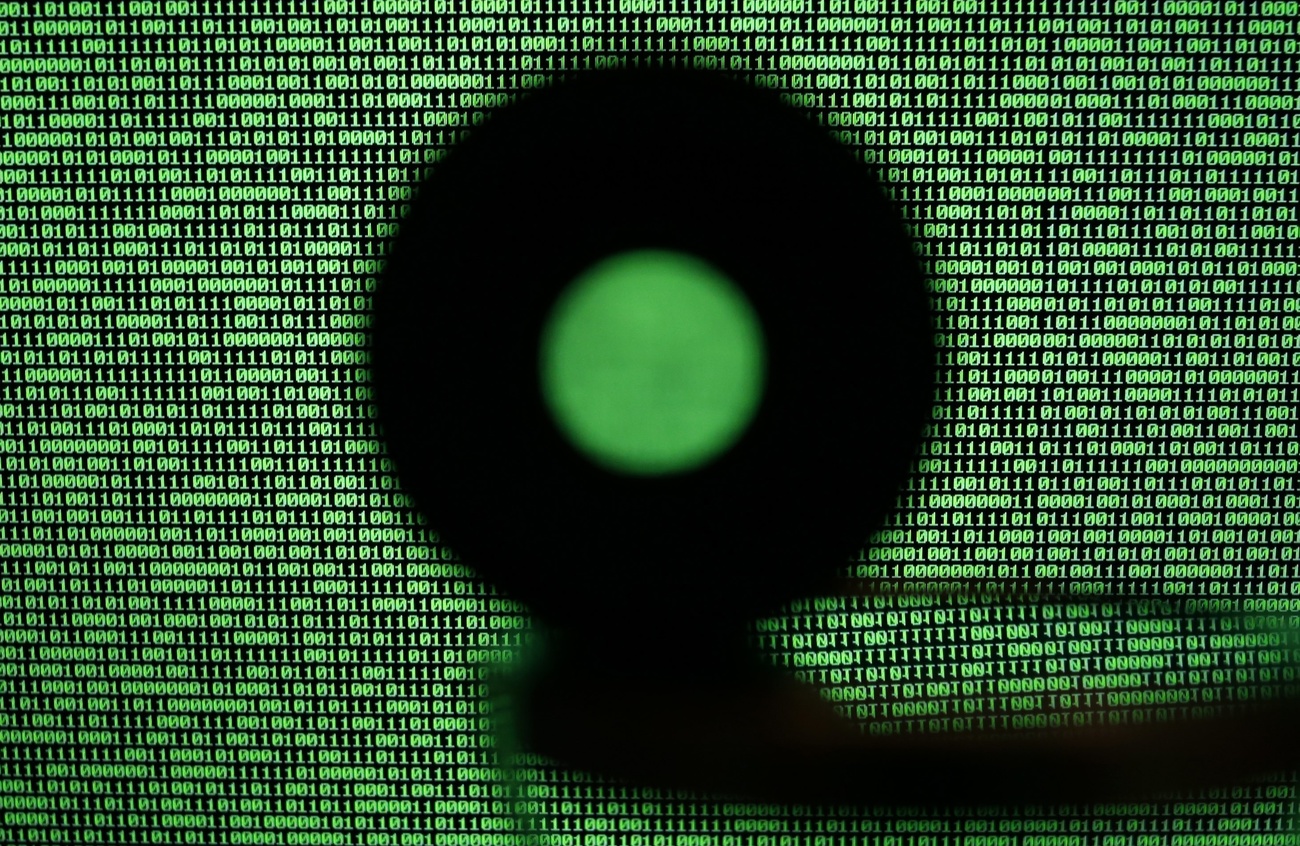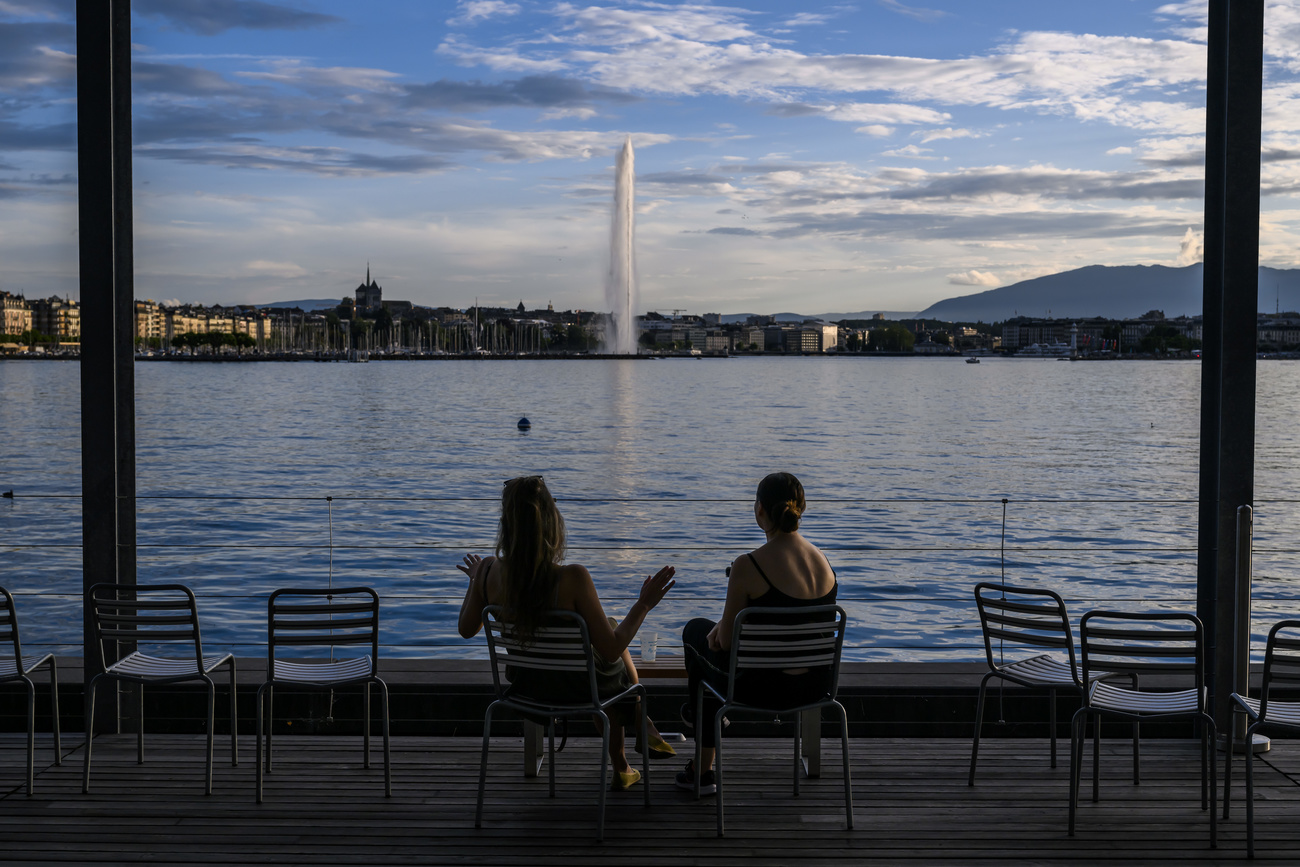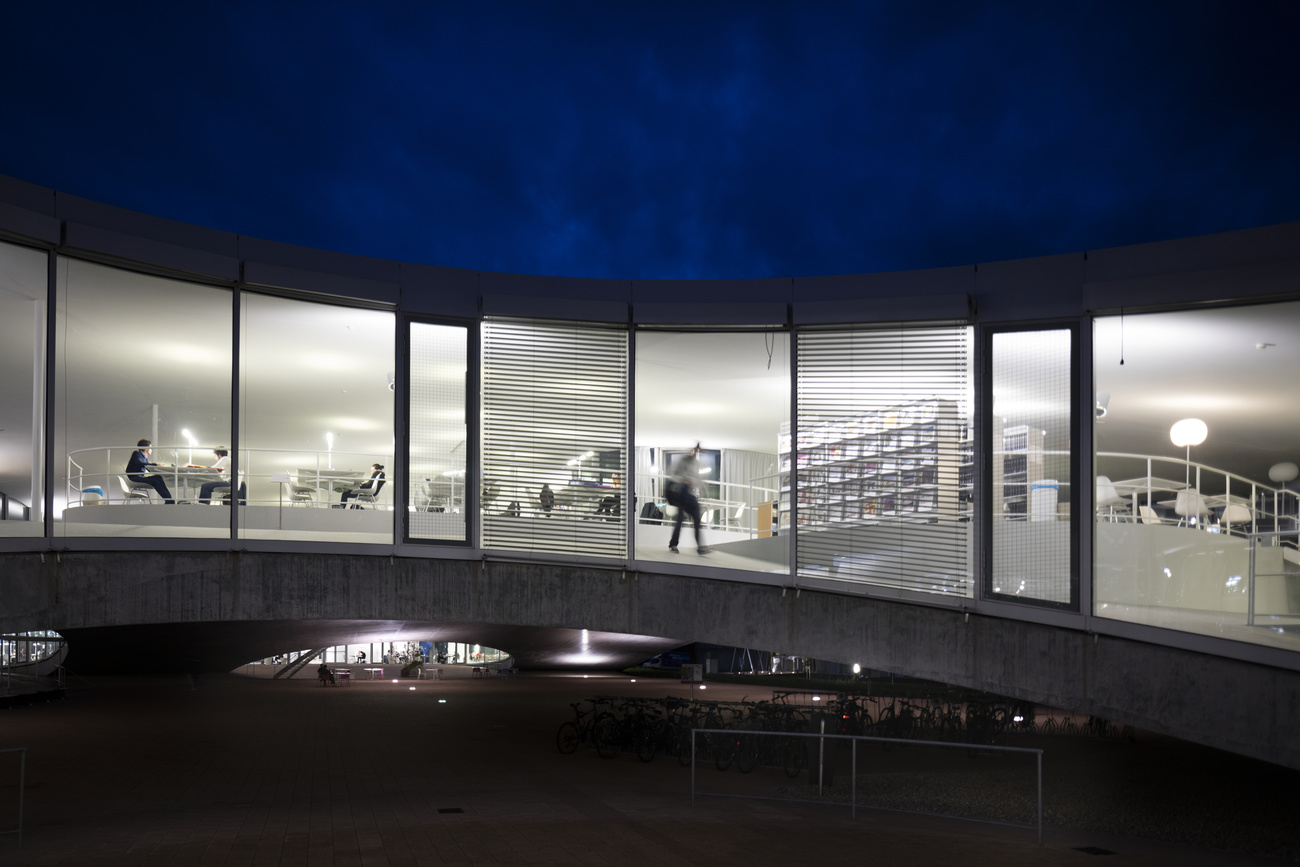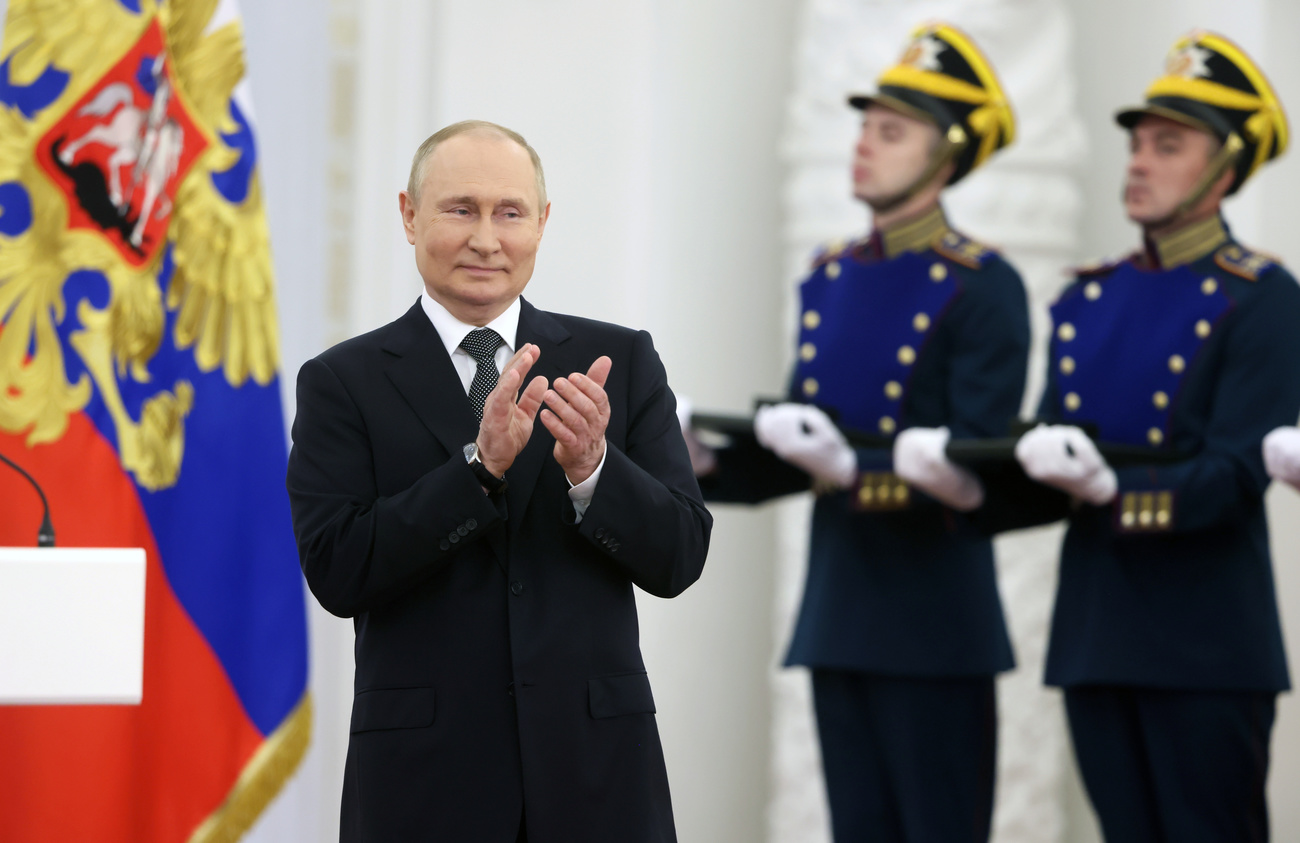
How a top Swiss university is screening Chinese students

The federal technology institute ETH Zurich has revealed security screening measures it routinely carries out on applications from foreign students from certain countries – provoking fear and anger from the Chinese academic community in particular. Will these screenings change the landscape of studying abroad for Chinese students?
“Why is ETH Zurich taking such harsh decisions and extreme measures against foreign applicants from certain countries? I don’t understand at all,” said Huang Xiaoyu*, his voice filled with anxiety as he spoke to SWI swissinfo.ch on the phone from China. Currently a biotechnology student at the University of Electronic Science and Technology of China in Chengdu, he has been preparing for more than a year to apply to study at the federal technology institute ETH Zurich, beginning in the autumn of 2025.
He has been learning German and has submitted a self-designed programme compatible with the master’s courses in computational biology and bioinformatics that he wants to study at the institute, which has approved this plan.
But now his dream of studying in Switzerland could be shattered. According to the criteria of the institute’s security screening mechanism, made public on OctoberExternal link 24, his nationality, school and choice of course could rule him out.
Controversial criteria
These security guidelines stipulate that, in accordance with the Swiss Federal Act on the Control of Dual-Use Goods, Specific Military Goods and Strategic GoodsExternal link and the Federal Act on the Implementation of International SanctionsExternal link, the institute is obliged to minimise the risk of outflow of technology and knowledge suitable for military use to countries which are subject to international sanctions – including Russia, Iran, Syria and China.External link
This means applications from students, faculty members or guest lecturers from certain countries, who would be able to obtain access to dual-use goods or key technologies if they were to come to ETH Zurich, will be subject to additional scrutiny, and may be rejected. This is particularly likely to be the case in research areas involving sensitive technology, such as GPS or drones.
The institute’s security screening is based on four criteria:
- Is the applicant’s country of origin (nationality, place of residence and biography are taken into account) a “risk country”?
- Has the applicant previously studied in an institution which poses a security risk?
- Will the applicant receive funding through a scholarship from a sanctioned country, or from improper or questionable sources?
- Is the area of study subject to increased official supervision or does it fall under the export control regulations for dual-use goods?
The first of these is proving the most controversial. “We don’t know how ETH Zurich defines ‘biography’. Do I have to report the detailed education and work experience of my family members and my former boyfriend to ETH Zurich? Will the second generation of Chinese immigrants born and living in Switzerland be rejected by ETH Zurich simply because their parents used to work in a ‘sensitive field’ in China?” one student, who wished to remain anonymous, told SWI swissinfo.ch. “This is obscure, unreasonable and unacceptable.”
ETH Zurich is a public research university renowned for innovation in science and technology. It has 16 faculties, which provide academic education and conduct scientific research in subjects ranging from engineering and architecture to chemistry and physics.
According to the latest Times Higher Education rankings, ETH Zurich is the best university in continental Europe. It is also ranked 7th overall in the 2024 QS World University RankingsExternal link, with three subjects ranked first in the world and a further 14 in the top ten.
Its alumni include 22 Nobel laureates, two Fields Medalists, three Pritzker Prize winners and one Turing Award winner. Among them are Albert Einstein, winner of the 1921 Nobel Prize in Physics, and John von Neumann, a pioneer in building the mathematical framework of quantum physics.
Although research security has become a growing concern for universities around the world, ETH Zurich appears to be going further than other institutions when it comes to scrutiny of foreign students. It screens all applications for a doctorate, a master’s degree, an employment vacancy or a visit from countries that are subject to United Nations, United States or European Union sanctions, as well as from states categorised by Switzerland as “risk countries” in terms of weapons or nuclear proliferation.
In addition, all applicants from 17 Chinese, 16 Russian and seven Iranian educational institutionsExternal link that are considered a “security risk” must undergo screening.
Almost all subject areas at ETH Zurich are affected, “as most technologies can also be used for military purposes or count as key technologies,” according to the university.
And while the criteria for these screenings have only recently been made public, they have in fact been in use at ETH Zurich for several years.
Wang Li*, a Chinese PhD student currently studying at the institute, revealed that after he enrolled in autumn 2023, a professor inadvertently told him that his application was stuck in the screening process because the project he had applied for was in the field of artificial intelligence.
“According to the professor, there was no explicit screening mechanism declared at the time, but a set of established procedures had been formed internally,” he said. Fortunately, his professor stood up for him, providing relevant documents on the specific content of the research project in which he would be involved.
In the end, Wang’s application was approved, but there are fears that he could become the exception. One Chinese researcher who gained a PhD in physics from ETH Zurich in 2021 and is currently living in Switzerland said: “I am worried that theoretically Chinese students still have a chance, but in practice there is basically no chance. Because there might be a lot of professors who don’t want to take the trouble.”
What does this mean for Chinese applicants?
The outline of these screening mechanisms has given particular rise to anxiety amongst the Chinese academic community, as the number of Chinese students at ETH Zurich has increased rapidly in comparison with other so-called “risk countries” in recent years. Between 2010 and 2023, this number rose from 271 to 1,362 at the institute, and from 139 to 598 at its sister university, the Swiss Federal Institute of Technology Lausanne (EPFL).
For decades, the United States was the External linkmost attractive study destination for Chinese students, whose enrolment in US universities tripled between 2009 and 2019.
External linkHowever, in 2020 then-president Donald Trump issued a presidential proclamation External linkimposing restrictions on Chinese students and researchers entering the country if they had links to an institution in China that implements the country’s military-civil fusion strategy. This strategy aims to develop the Chinese army into a world-class military by 2049, by ensuring that scientific innovations simultaneously drive economic and military development. The Biden administration has continued to enforce this proclamation.
The Covid-19 pandemic simultaneously had an impact on Chinese students travelling to the US – in multiple ways. China closed its borders from March 2020 to January 2023, forcing many Chinese students to cancel their plans to study in the US. In addition, China’s prolonged economic downturn since the outbreak of the pandemic has prompted its students to look for more affordable study destinations. Unlike US universities, which balance their books with the help of high fees paid by international students – between $10,000 (CHF8,795) and $55,000 per yearExternal link – Swiss public universities are financially supported by the government, making tuition fees a much more manageable CHF435 to CHF3,100 ($490 to $3,495) per semesterExternal link.
Chinese students in the US were also subjected to stigma and discrimination during the pandemicExternal link, due to the Covid-19 virus having originated in China. These ranged from hostility and exclusion to violent attacks, further dampening enthusiasm for studying in the country.
As a result, the number of Chinese students in the US has fallen by more than 20% in the last five years – from 370,000 in 2019 to 290,000 in 2024 – according to the US State Department, with applications to Swiss institutions simultaneously rising.
Falling acceptance rates
But this may not be a trend that continues, if security screening policies have a negative longer-term impact.
In an opinion pieceExternal link published in the South China Morning Post, Li Zhuowen, a Washington-based researcher focused on the Chinese political economy and international development, wrote that Chinese students, particularly those in STEM fields, “see their academic dreams derailed entirely, shying away from pursuing degrees in the US because of security screening and pivoting to Europe only to find themselves in the crosshairs again”.
The acceptance rate for Chinese applicants for master’s degrees at EPFL has fallen significantly over the past decade, from 44% to 12% between 2014 and 2024, making it much lower than the international acceptance rate of 21%. ETH Zurich did not provide statistics on the acceptance rate of students from countries subject to security screening upon our request.
ETH Zurich responds to rumours
Last September, rumours of a so-called “blacklist” of Chinese institutions began to spread in Swiss academic circles, after a reporter from Heidi.newsExternal link overheard a researcher mention the existence of a list of universities whose students were no longer welcome at “a major institution on the shores of Lake Zurich” – the location of both ETH Zurich and the University of Zurich.
Since releasing its screening guidelines – an announcement it says it made for reasons of “transparency”, according to its spokesperson Markus Gross – ETH Zurich has denied allegations of “blacklistingExternal link”, “a one size fits all approachExternal link” or “racial discriminationExternal link” against Chinese applicants. Gross told SWI: “There are no hard exclusion criteria or automatic mechanisms; each application is assessed individually. If a person with the nationality of a sanctioned country has his or her centre of life in another country, this will be taken into account.”
To assuage critics and explain how the process works, the institute planned to hold an event for students from countries subject to security screening at the end of October. However, due to a higher than expected number of registrations, it had to reschedule and switch the format to a webinar to allow all interested parties – more than 1,000 people – to attend.
During this meeting, Silvia Nast, head of the Export Control Office at ETH Zurich, said: “The published lists are not blacklists or banned lists.” She added that these lists are intended to help the university identify applications that require further assessment, saying: “This list is not a criterion for rejecting an application. No one is excluded on the basis of their nationality.”
When asked in an interview with the newspaper NZZ am SonntagExternal link why sanctions imposed by the US, the EU and the UK were being implemented by a university in a neutral country, Nast attributed this to ETH Zurich’s duty of care towards its staff. “The majority of our professors come from abroad […] and we have to ensure that they do not violate the laws of their country of origin.” She also emphasised the importance of export controls to foreign researchers in an internal External linkmemo, which read: “Violations [of export control regulations], even those arising from carelessness, can trigger huge fines for individuals, and even prison sentences in more severe cases.”
For Jean-Marc Rickli, director of global and emerging risks at the Geneva Centre for Security Policy, to argue that universities in a neutral country should not participate in sanctions is a misinterpretation of Swiss neutrality because “the law on neutrality does not cover sanctions”. And according to the Swiss foreign ministry’s White Paper on Neutrality, the law on neutrality can only be applied in the case of an actual war between states. “Each neutral state can decide which sanctions it wants to participate in,” said Rickli.
Not a ‘political refuge’
For Huang, who has been preparing his application for 2025 from China, studying abroad is about seeking greater academic freedom, and his disillusionment with the economic uncertainties in China. “In recent years, the youth unemployment rate in China has remained high, the political climate remains tense and the space for personal development is getting smaller,” he said. “I hope to use studying abroad to leave China, put down roots overseas and seek a broader development path.”
Many Chinese students SWI swissinfo.ch spoke with echoed these sentiments. Studying abroad in Western countries has long been a way for students and researchers to escape countries with authoritarian regimes, such as China – or Russia.
Last March, the academic umbrella group Swissuniversities recommended that scientific cooperation with Russian universities be reviewed, and suspended if there was a risk of supporting the Kremlin’s aggressive policies – a recommendation almost all Swiss universities, including ETH Zurich, have followed. Since the Russian invasion of Ukraine, ETH Zurich has tightened admission requirements for Russian applicants, who are subject to scrutiny due to export control regulations and the EU sanctions against Russia adopted by the Swiss government. “We are being condemned for the crimes of a regime whose course we do not approve of,” one Russian student told Beobachter magazineExternal link.

More
How Swiss universities combat espionage from high-risk nations
ETH Zurich spokesperson Gross rejected all accusations of “collective punishment” on Russian or Chinese students, while EPFL spokesperson Emmanuel Barraud said: “Applications from foreign students are assessed based on multiple criteria, among which capabilities are paramount, as this prevents our school from being used as a ‘political refuge’ for people who do not have the necessary qualifications to follow our courses.”
Elsewhere in the West
The EU does not have a standard policy for universities on security checks for countries under international sanctions, meaning each institution is free to regulate their admissions in their own way. ETH Zurich is far from the only university in Europe to have introduced security screening.
In 2022, Aarhus University in Denmark began a pilot project on background screening of all PhD and post-doctoral candidates in technical and natural sciences from China, Iran and Russia before they are admitted to the school’s Faculty of Technical Sciences. This year, these background checks have been extended to cover the entire university.
In addition, since 2023, scholarship funding from the state-run China Scholarship Council has been considered a red card, barring its holders from admission to an increasing number of European universities – including Aarhus University, Sweden’s Karolinska Institute, Germany’s Friedrich-Alexander University of Erlangen-Nuremberg, and the Eindhoven University of Technology and Maastricht University in the Netherlands.
Beyond the EU, the UK introduced the Academic Technology Approval SchemeExternal link in 2007, under which postgraduate applicants from abroad (with the exception of those from the European Economic Area and Switzerland) require security vetting to study subjects where knowledge could be used in weapons programmes. In 2020, the UK government expanded this scheme to include areas of study which could cover advanced conventional military technologies – for example, much of the fields of physics, engineering and computer science. It expanded it further the following year to cover researchers and postgraduate students of certain nationalities and in certain research fields to prevent intellectual property theft.
Figures obtained by The Guardian newspaper reveal thatExternal link 265 researchers and 839 postgraduate students’ applications were rejected via UK Foreign Office vetting in 2022 – 1,104 of the 50,000 who applied – up from 128 in 2020 and just 13 in 2016. Although the Foreign Office declined to provide a breakdown by nationality, data from leading universities such as Oxford, Cambridge and Imperial College London suggests that, at these institutions at least, Chinese academics account for the majority of those denied clearance.
Alicia Kearns, chair of the UK’s Foreign Affairs Select Committee, wrote in a post on X (formerly Twitter): “For too long academia has pretended it has no role to play in our national security and can operate free from geo-strategic realities.” She added that this was a mindset that made the UK “vulnerable to hostile states” and that “significant evidence indicates a systematic attempt by the [Chinese Communist Party] to infiltrate British academia and exfiltrate critical research, capabilities and technologies”.
For too long Academia has pretended it has no role to play in our national security and can operate free from geo-strategic realities – this is an outdated mindset making us vulnerable to hostile states.
— Alicia Kearns MP (@aliciakearns) April 26, 2024External link
I hope with this very welcome move we can better protect one of our… pic.twitter.com/sTjYaqZDA1External link
Rickli, of the Geneva Centre for Security Policy, believes that, given the current geopolitical context and increasing polarisation, “it is very likely that more European universities will introduce screening mechanisms, as science and technology are becoming key indicators and enablers of global power”.
It remains to be seen how effective these mechanisms will be, and the impact they will have. But it is clear that ETH Zurich, and other European universities, will have to strike a delicate balance between national security and the academic freedom they are renowned for.
One Chinese PhD student at ETH Zurich highlighted this dilemma, telling us: “In the long run, ETH Zurich’s reputation will be damaged by this action, especially in China. Its values of equality, diversity and inclusion will also be called into question. This will make more students and scholars from other countries – even those not on the sanctions list – hesitate over whether to come to ETH Zurich.”
* Names have been changed to protect the students’ identities.
Edited by Lindsey Johnstone/gw

More
Our weekly newsletter on foreign affairs

In compliance with the JTI standards
More: SWI swissinfo.ch certified by the Journalism Trust Initiative





































You can find an overview of ongoing debates with our journalists here . Please join us!
If you want to start a conversation about a topic raised in this article or want to report factual errors, email us at english@swissinfo.ch.